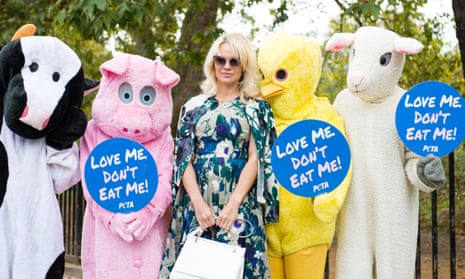One in eight Britons are now vegetarian or vegan, according to a report on food shopping that underlines a revolution in the UK’s eating habits.
A further 21% claim to be flexitarian, where a largely vegetable-based diet is supplemented occasionally with meat, which means a third of UK consumers have deliberately reduced the amount of meat they eat or removed it from their diet entirely.
The findings in the annual food and drink report from the supermarket chain Waitrose come as food choices assume an increasingly important role in the debate over countering climate change. A series of influential reports have said that avoiding meat and dairy products is the single biggest way consumers can reduce their environmental impact on the planet, because farming animals is such a CO2-intensive process.
“It’s extremely encouraging to learn how many Britons are choosing to reduce their consumption of animal products” said Nick Palmer, the head of Compassion in World Farming UK. “Science proves that the healthiest diet is one that is plant-heavy. By eating less meat, fish, eggs and dairy and choosing higher welfare when we do, we can all help animals, people and the planet.”
The Waitrose report is based on research among shoppers across all British supermarket chains. The retailer’s executive chef, Jonathan Moore, said: “Vegetarianism has grown and evolved. More people dip in and out of it. There was a time when choosing a plant-based diet was about taking an ethical stand based on unwavering principles. For many, this distinction between vegetarians and meat-eaters still exists but for others the lines have blurred.”
Publication of the findings represents awkward timing for Waitrose. It comes a day after the editor of its food magazine, William Sitwell, said he was stepping down after an email exchange with a freelance journalist emerged in which he mocked vegans and suggested they should be force-fed meat.
The number of vegans in the UK, who shun all animal products including dairy and eggs, has grown fourfold in the past four years from 150,000 to 600,000, according to the Vegan Society.
Waitrose was the first UK supermarket to install dedicated vegan sections in 134 of its stores in May. It has also launched a range of more than 40 vegan and vegetarian ready meals. Vegan dining out is also booming, the report notes, with the Good Food Guide highlighting restaurants with dedicated vegan menus for the first time this year after many high street chains and pubs increased their non-meat-and-dairy options.
“This year, we’ve seen vegan food go mainstream” said Natalie Mitchell, Waitrose’s head of brand development. “Whether cooking at home, buying prepared food or trying the newly vegan-friendly restaurants, people are discovering that it tastes amazing.”
About 60% of vegans and 40% of vegetarians surveyed said they had adopted the lifestyle over the past five years, with 55% citing animal welfare concerns, 45% health reasons and 38% environmental issues. People in the 18-to-34 age group were more likely to switch to veganism, with much less enthusiasm among the over-55s. Many of the vegan and vegetarian respondents said they missed bacon sandwiches and pork scratchings.
Waitrose’s report is based on millions of the supermarket’s transactions in shops and online, bolstered by a poll of 2,000 adults who shop across a range of retailers. The research chimed with consumers’ growing fears among about their impact on the environment. Scientific research published this year found that without meat and dairy consumption, global farmland use could be reduced by more than 75% – an area equivalent to the US, China, the EU and Australia combined – and still feed the world.
The Waitrose report found that 88% of respondents who saw the final episode of BBC’s Blue Planet II about the effect of plastics on our oceans had since changed their behaviour. Waitrose said it had fielded an 800% increase in questions about plastics from customers in the wake of the episode.
The supermarket also hailed jackfruit, a fleshy fruit grown in south-east Asia, Brazil and Africa, as a popular ingredient in its vegan-friendly ready meals and a meat-free alternative to pulled pork. In the drinks aisle, Waitrose singles out the popularity of organic wine. Sales have increased by 53% year-on-year, and it collection of 54 wines from 18 regions is set to grow further.
Waitrose’s managing director, Rob Collins, said: “Being mindful of how we live and eat has become a priority in today’s world. As we become increasingly mindful of our own health, the wellbeing of our family and that of the planet, we’re reshaping how we shop, cook and eat.”
